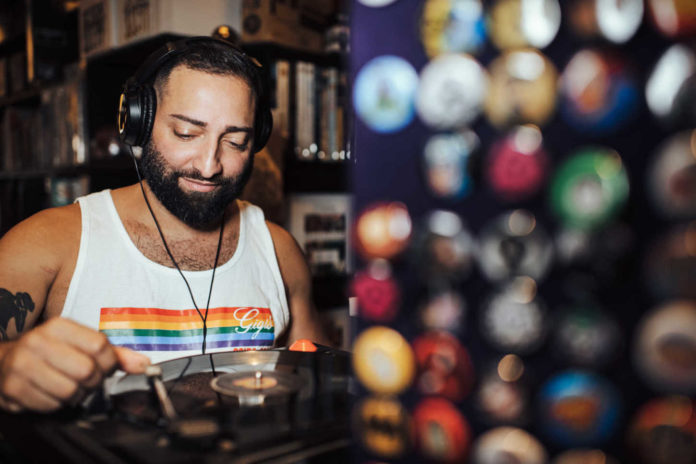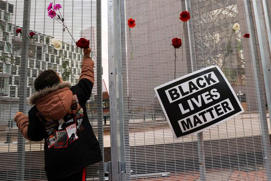Jason Misleh is not a magician, nor is he a puppeteer. He is, however, an expert in making bodies move.
Misleh, better known on the club circuit as DJ Jace M, has 20 years of experience choosing the perfect songs and crafting the perfect beats to get people onto the dance floor.
It starts with a love of music.
“Music is my go-to for everything,” Misleh tells Pride Source. “It literally is my life,” he says, whether he’s sitting down listening to music, writing his own or playing music for crowds of people in a club.
Misleh has been playing instruments his entire life and has studied music theory, a background he says lends to his DJ skills.
“This all started with me playing the piano,” he says. “I was forced to play the piano, and I fucking hated every second of it. Now I have a grand piano in the house, and I play it all the time.” He laughs. “So I guess my parents did something right.”
That’s not the only thing his parents did right. When Misleh came out as gay, they were immediately accepting.
“My mom knew. When I left for college, she was just like, ‘I know.’ My dad didn’t care. I had a really easy coming out story,” he says. “I know it really sucks for some people, and I feel like I’m rubbing it into people’s faces that I have the parents that I have.” His younger sister, who lives in Detroit, also embraces Misleh.
The Misleh family moved to Michigan from Washington D.C. when Misleh was a high school student. After graduation, Misleh attended Michigan State University, where he majored in computer science.

In addition to being a DJ, Misleh is also a computer engineer for the well-known cloud computing company VMware.
“I love it,” he says. “It’s challenging. I’ve been working there a long time. It’s a great company to work for. We have a lot of really cool diversity and inclusion programs. I love being able to be out at work.”
While computer engineering doesn’t directly give him an advantage as a DJ, Misleh says it does help him as a music producer.
“Music production in 2021 is very software-driven,” he says, adding that you no longer have 10 different people coming into a studio to play 10 different instruments. It’s all done on the computer. “I understand production software a lot quicker than I probably would have if I were a doctor,” he says.
Part of Misleh’s job as a DJ is remixing songs to make them work for gay dance floors. “I think when I hear songs, it’s very easy for me to understand how that song will do on a dance floor,” he says, adding that he hears production components the average listener would not necessarily notice, like whether the hi-hat hits on the upbeat or the downbeat. “In dance music, a lot of top 40 stuff has to be re-engineered to fit the vibe of an event.”
Remixing a song, he says, “is very involved.” The goal is to take a top 40 pop song that is, say, 80 beats per minute (BPM) and make that song work to fit 126-132 BPM.
“You’re essentially rewriting everything except for the lyrics and the melody of the song,” he says. And you can’t simply speed it up. “Because then you’ve got Alvin and the Chipmunks.”
Misleh just finished a remix of Coldplay’s “Fix You,” an unlikely dance floor anthem, at the special request of Luiz Misleh.
“He happens to be married to me, so he gets a lot of what he wants,” Misleh says.
Luiz and Jason met in Miami and married on Sept. 2, 2020, but because of COVID, it was an intimate event with just a few people present. “We’ll have a big wedding party once things have settled down,” Misleh says.
Being married is “great,” he says. “We are very happy and, knock on wood, if we haven’t killed each other during COVID, I think we’ll be good for a long time.”
Misleh and his frequent remix partner Toy Armada spent a lot of time on “Fix You.” “We made probably 12 different versions of this song before we picked the one,” Misleh says.
The result is a dance song perfect for ending a night at the club.
“It’s a chill song to get you ready to go home,” he says. “It does great on the dance floor.”
Another example of his recent work is Brett Oosterhaus and Debby Holiday’s “Love & Beats,” which he also remixed alongside Toy Armada. The lyrics are especially appropriate for Misleh: “I know exactly what I want, and I know just how to get it. What I want is love and beats.”
As a DJ, Misleh gets both. “I get paid to play my favorite songs for people,” he says. “We are all connected on the same level when it comes to music.”
And, yes, a real live DJ is a must-have. A Spotify playlist isn’t going to cut it.
“There’s a lot of things that people don’t know that go into playing in a nightclub,” he says. For one, you can’t play everyone’s favorite songs early in the night, or people will leave. “If you play too many high-energy songs without any breaks, people are going to get tired, and they’re going to go home.” And if you don’t have any downtime, then patrons “never go to the bar to buy drinks, and now the club owner’s pissed.” These aren’t calls a Spotify playlist can make.
“Anyone can quickly learn how to match beats together,” he says, “but it’s really the experience of understanding the flow of a club and being able to read people’s body language on the dance floor to really decide what direction something needs to go.”

Through his production company Thots & Prayers, Misleh will play a key role in both Ferndale Pride and Motorball.
Misleh is the production manager for Motorball, which takes place Thursday, Sept. 30 through Sunday, Oct. 3.
Thots & Prayers is also sponsoring and producing the dance pavilion for Ferndale Pride on Oct. 2. And he fully expects you to be there.
“Pride to me is a celebration of who we are and who we’ve become, but also, more importantly, I believe that Pride is something that we should all participate in because it’s a time for people who aren’t out…to come out and see that things are OK and they’ll be accepted,” he says. “Maybe not right this second in their life, but that, eventually, life is going to be OK.”
Misleh wants to make clear that you aren’t too good for Motorball or Ferndale Pride — skipping to go to Chicago or another major city’s Pride is “unacceptable.”
“You’re not going for yourself,” he says. “You live three blocks away. Stop being a bitch, get your shit together, and let’s go.”
In other words, it isn’t all about you.
“I think that there is a responsibility attached,” he continues. “You get to have fun in this specific responsibility, but I do think that we are responsible for creating a place for people who are having trouble or struggling to be themselves [to] know it’s OK.”








